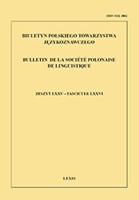Problemy z definicją dokonaności
Problems with the definition of perfectivity
Author(s): Małgorzata NowakowskaSubject(s): Sociolinguistics, Descriptive linguistics, Western Slavic Languages
Published by: Polskie Towarzystwo Językoznawcze
Keywords: Aspect; perfectivity; telicity; perfect meaning; actionality;
Summary/Abstract: Polish has grammaticalized the opposition perfectivity vs. imperfectivity using prefixes or suffixes attached to verbs or allomorphic and suppletive forms of verbs. This morphological opposition does not entail a clear semantic opposition. This article presents the attempts to find this meaning with respect to perfectivity. Discussing its different definitions, we show that they exclude certain groups of Polish verbs. The definition according to which a perfective verb represents a situation as a point does not apply to durative verbs (e.g. pol. zbudować ‘to build’). The definition according to which a perfective verb rep resents a situation that has reached a natural endpoint applies only to telic verbs, excluding others (e.g. pol. popracować ‘to work for a short period of time’). The definition according to which a perfective verb represents a situation in a retrospective manner fits, at the same time, verb forms with perfect meaning in those languages which grammaticalized it. The latter definition creates the risk of confusing perfectivity with perfectiveness, which is particularly unfortunate in contrastive linguistics. Therefore we argue that the most adequate is the so-called “holistic” definition of perfectivity, according to which a perfective verb represents a situation as a whole, which means that the speaker takes into account neither its development in time nor its subsequent phases.
Journal: Biuletyn Polskiego Towarzystwa Językoznawczego
- Issue Year: LXXVI/2020
- Issue No: 76
- Page Range: 337-359
- Page Count: 23
- Language: Polish

